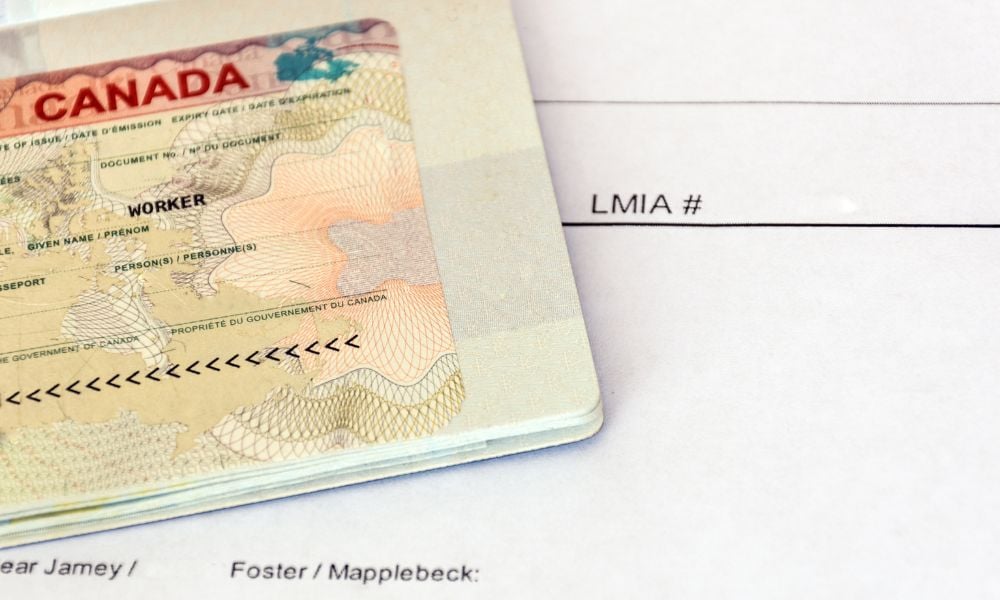
'There are numerous scammers out there in the world, who are making these fake LMIAs'

A British Columbia-based immigration consultant has reported fraudulent Labour Market Impact Assessment (LMIA) documents that falsely listed her company as a third-party representative, according to a report.
Neera Agnihotri, an immigration consultant based in Surrey, discovered that her firm, Agnihotri Immigration Consulting Inc., had been named without her consent on two LMIA applications submitted for foreign workers seeking employment in British Columbia. The documents appeared legitimate at first glance but contained subtle signs of forgery, including typographical errors and inconsistencies in formatting, CBC reported.
"I was like, 'No, this is not our client,'" Agnihotri said in the report.
She noted that one of the documents contained a misspelling of her company’s name, while another showed altered font styles.
The LMIAs were reportedly submitted on behalf of two employers—an Okanagan construction company and a trucking firm based in Abbotsford—neither of which had any relationship with Agnihotri’s firm. Both businesses denied knowledge of the applications, according to CBC News.
Agnihotri believes the fraudulent documents may have been based on previously approved LMIAs and reused as templates by scammers. She has since forwarded the paperwork to Employment and Social Development Canada (ESDC), which confirmed to CBC that it is investigating the matter, although the department does not release public data on LMIA-related fraud.
In December 2024, Canadian immigration authorities said they plan to eliminate the advantage of job offers supported by LMIA in applications for permanent residency (PR), aiming to curb fraudulent practices.
LMIAs are required by employers to hire foreign workers through Canada’s TFW Program and are issued by ESDC to confirm that there is a genuine need for a foreign national to fill a specific role. Possession of an LMIA can also support applications for permanent residency.
However, immigration consultants and advocates say the documents have increasingly become targets for criminal exploitation. According to CBC investigations, fake LMIAs have been sold for as much as $45,000 to individuals seeking work in Canada. These workers are often unaware that the documents are fraudulent until their applications are rejected.
"There are scammers, numerous scammers out there in the world, who are making these fake LMIAs and selling them to unsuspecting workers who have this glimmer of hope that they might be able to get a job in Canada," said Cassandra Fultz, an Ontario-based immigration consultant, in the CBC report.
The College of Immigration and Citizenship Consultants (CICC), which regulates licensed immigration professionals, confirmed that any scenario where a prospective worker is asked to pay for an LMIA constitutes fraud. The CICC said it has recently taken action to shut down more than 5,000 unauthorized web and social media pages promoting fake immigration services.
Fultz told CBC that her office routinely receives inquiries from individuals asking if their documents are authentic.
"It's never real," said Fultz. "Some of them look pretty good, they have a lot of the details correct, but some are just a little bit off. And some of them look totally ridiculous.”
Immigrants looking to land employment in Canada are being asked to pay tens of thousands of dollars by employers who are abusing the Temporary Foreign Worker (TFW) Program, and more groups are now speaking up about the abuse, according to a previous report. Visitors to Canada often buy an LMIA through unethical consultants and employers to convert their visitor visas into work permits, said Manan Gupta, president of Skylake Immigration, in a TruckNews.com report.
Both Agnihotri and Fultz are calling for stronger government intervention to protect licensed consultants from identity misuse and to prevent foreign workers from being defrauded. The growing use of counterfeit LMIAs, they say, threatens the credibility of Canada's immigration system and risks undermining legitimate efforts to recruit international talent.
In May 2024, the owner of an Edmonton-based immigration business was convicted for charging $30,000 and $45,000 to arrange employment for foreign workers, according to a previous CBC report.
The LMIA scheme has been evolving for the past 30 years, said Centre for Newcomers CEO Anila Umar in the same CBC report.
The federal government temporarily banned 24 Canadian metropolitan areas from accessing a feature of the TFW Program. ESDC is not processing low-wage LMIA applications for employers in these cities.